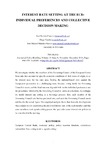Interest rate setting at the ECB: Individual preferences and collective decision making

Use este enlace para citar
http://hdl.handle.net/2183/9841Coleccións
- Investigación (FEE) [927]
Metadatos
Mostrar o rexistro completo do ítemTítulo
Interest rate setting at the ECB: Individual preferences and collective decision makingData
2011Cita bibliográfica
Cancelo, José Ramón, Diego Varela and José Manuel Sánchez-Santos.(2011) 'Interest rate setting at the ECB: Individual preferences and collective decision making', Journal of Policy Modeling 33(6): 804-820.
Resumo
We investigate whether the members of the Governing Council of the European Central Bank take into account the specific economic conditions of their states of origin, to set the interest rates for the euro area. Testing the national-based view against the Europeanist perspective is a challenging issue, because voting inside the Governing Council is secret, and the final outcome depends both on the individual preferences and the procedures followed by the Governing Council to arrive at a decision. Accordingly, we model interest rate setting as a two-stage process: first, each member of the Governing Council sets his/her preferred rate, and next the Governing Council meets and decides the actual figure. Our empirical analysis shows that domestic developments play a major role in determining the preferred interest rate of the each member; and that some members exert agenda setting power, that precludes some interest rate policies to be considered at the meeting.
Palabras chave
European Central Bank
Monetary policy
Policy reaction function
Committees
Nationalistic bias
Voting models
Agenda setting
Monetary policy
Policy reaction function
Committees
Nationalistic bias
Voting models
Agenda setting
Versión do editor
ISSN
0161-8938





